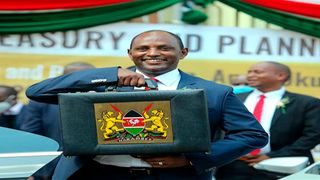
Treasury Cabinet Secretary Ukur Yatani.
| FileBusiness
Premium
Uhuru’s Sh3.31tn legacy budget
Treasury Cabinet Secretary Ukur Yatani plans to raise the final budget under the Jubilee administration by Sh278.81 billion, putting revenue collection pressure on the regime to succeed President Uhuru Kenyatta.
The Treasury plans to spend Sh3.31 trillion in the year starting July 2022, a growth of 9.2 percent from Sh3.03 trillion in the current year, the draft Budget Policy Statement (BPS) 2022 shows.
The ceiling for the Executive’s budget has been put at Sh2.02 trillion, which is 6.97 percent more than the current Sh1.89 trillion estimate, according to the plan, which has been published earlier because the next year’s budget will be read two months earlier because of the August 2022 General Election.
Parliament’s budget has been increased 1.57 percent to Sh38.48 billion, while the Judiciary’s is up 5.39 percent to Sh18.88 billion.
Expenditure for counties is projected at Sh370 billion which is unchanged from the current budget, while priority expenditures to repay debt and honour pension claims have been bumped up 20.03 percent to Sh864.13 billion from Sh718.32 billion.
The Treasury says the budget will largely focus on funding programmes aimed at boosting economic recovery from the Covid-19 knocks and achieving Mr Kenyatta’s lagging Big Four Agenda.
“Spending will be directed towards the most critical needs of the country with the aim of achieving quality outputs and outcomes with existing or lower level of resources,” the Treasury says.
“Further, the government will ensure MDAs’ (ministries, departments, and agencies) request for resources are realistic and take into account the resource constraints in light of the fiscal consolidation policy.”
The Treasury has over the years struggled to meet targets in its fiscal consolidation programme, which largely focuses on cutting down on recurrent expenditure and enhancing tax collections.
Some of the spending cuts that the Treasury has been trying to double down on are hospitality, training, and travel.
Mr Kenyatta’s administration has also frozen new employment in public service since 2013 except for essential sectors such as healthcare, education, and security in a bid to tame the runaway public wage bill.
The public sector wage bill jumped 85.11 percent to Sh694.05 billion in the year ended June 2021 from Sh374.94 billion in 2013, according to the data by the Kenya National Bureau of Statistics.
The president who will take over from Mr Kenyatta will need to mobilise Sh342.20 billion more in ordinary revenue than prevailing estimates to meet the funding needs.
Ordinary revenue – comprising taxes and non-tax streams such as court fines, charges for use of government services, rent of buildings, and forfeitures — is projected at nearly Sh2.41 trillion for the year starting July 2022 against the Sh2.06 trillion estimates for the current year.
“Revenue performance will be underpinned by the on-going reforms in tax policy and revenue administration and boosted by economic recovery occasioned by the implementation of priority programmes under the Economic Recovery Strategy (and), the ‘Big Four’ Agenda,” Treasury wrote in the draft BPS.
“In particular, the reversal of tax cut measures which took effect from January 2021, will enhance revenue collection. In addition, in the FY 2021/22, the government is implementing tax policy measures through the Finance Act, 2021 that will boost revenue performance.”





